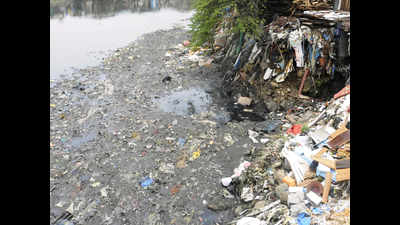- News
- City News
- mumbai News
- BMC puts Rs 10,000 crore sewage plant tenders on hold
Trending
This story is from February 17, 2019
BMC puts Rs 10,000 crore sewage plant tenders on hold

Picture for representational purpose only
MUMBAI: The BMC has put its Rs 10,000 crore sewage treatment plant tendering process on hold following a recent National Green Tribunal (NGT) order that has stayed the 2017 ministry of environment and forests notification relaxing sewage discharge regulations.

NGT has asked an expert committee to examine the effects of the relaxed conditions on biochemical oxygen demand (BOD) and total suspended solids (TSS) in water bodies.Both BOD and TSS levels must be maintained in water bodies to ensure safety of marine life. (See box).
The committee has been asked to submit its report before March 31.
The BMC and the state government had written to the environment minister, requesting his intervention to ensure the project, “which has been moving at a snail’s pace since 2007”, does not get further delayed.
The BMC had invited the tenders to set up six sewage treatment plants at different locations in the city with the capacity to treat 1,842 million litre per day (MLD) of sewage. The tendering process was in its final stages when the NGT issued its order.
The BMC discharges the sewage into the sea after preliminary treatment.
The current sewage infrastructure was developed by 2003 and, in 2007, the BMC conceptualized that the facility could be upgraded with the help of advanced sewage treatment plants.
The aim was to stop degradation of coastal environment, which would also help improve the water quality at the beaches.
Till last year, though, the plan made no progress due to various factors, chiefly protection of mangroves where sewage plants were proposed, forest, environment and costal clearances, and standards for discharging treated effluents into the sea.
In 2015, the environment ministry issued strict draft guidelines for discharge of effluents by including a condition that the TSS level should be 20mg per litre and BOD 10mg. The BMC found roping in a contractor for the job an uphill task. It then approached the Union government to get the effluents norms relaxed. In 2017, the environment ministry issued a final notifiction where it relaxed the norms by increasing the TSS level to 50 and BOD to level 20 for metro cities.
The BMC invited fresh tenders on the relaxed conditions in 2017 and completed the process of scrutinizing the technical details of the submitted bids.
BMC commissioner Ajoy Mehta told TOI: “We have decided against proceeding further till further clarity on the issue and have requested the Union ministry’s intervention.”
A senior civic official said the 2015 ministry standards was “very strict”, which would have increased the total project cost by around 30%.
He said, “Such conditions are meant for a city that discharges its sewage into rivers or lakes. It should not be made mandatory for a city like Mumbai that discharges sewage into the sea.”

NGT has asked an expert committee to examine the effects of the relaxed conditions on biochemical oxygen demand (BOD) and total suspended solids (TSS) in water bodies.Both BOD and TSS levels must be maintained in water bodies to ensure safety of marine life. (See box).
The committee has been asked to submit its report before March 31.
The NGT order was issued on a petition filed by an activist who alleged that relaxation in sewage discharge norms will lead to widespread degradation of water quality (in Mumbai, the sea) and disturb the marine ecosystem.
The BMC and the state government had written to the environment minister, requesting his intervention to ensure the project, “which has been moving at a snail’s pace since 2007”, does not get further delayed.
The BMC had invited the tenders to set up six sewage treatment plants at different locations in the city with the capacity to treat 1,842 million litre per day (MLD) of sewage. The tendering process was in its final stages when the NGT issued its order.
The BMC discharges the sewage into the sea after preliminary treatment.
The current sewage infrastructure was developed by 2003 and, in 2007, the BMC conceptualized that the facility could be upgraded with the help of advanced sewage treatment plants.
The aim was to stop degradation of coastal environment, which would also help improve the water quality at the beaches.
Till last year, though, the plan made no progress due to various factors, chiefly protection of mangroves where sewage plants were proposed, forest, environment and costal clearances, and standards for discharging treated effluents into the sea.
In 2015, the environment ministry issued strict draft guidelines for discharge of effluents by including a condition that the TSS level should be 20mg per litre and BOD 10mg. The BMC found roping in a contractor for the job an uphill task. It then approached the Union government to get the effluents norms relaxed. In 2017, the environment ministry issued a final notifiction where it relaxed the norms by increasing the TSS level to 50 and BOD to level 20 for metro cities.
The BMC invited fresh tenders on the relaxed conditions in 2017 and completed the process of scrutinizing the technical details of the submitted bids.
BMC commissioner Ajoy Mehta told TOI: “We have decided against proceeding further till further clarity on the issue and have requested the Union ministry’s intervention.”
A senior civic official said the 2015 ministry standards was “very strict”, which would have increased the total project cost by around 30%.
He said, “Such conditions are meant for a city that discharges its sewage into rivers or lakes. It should not be made mandatory for a city like Mumbai that discharges sewage into the sea.”
End of Article
FOLLOW US ON SOCIAL MEDIA










